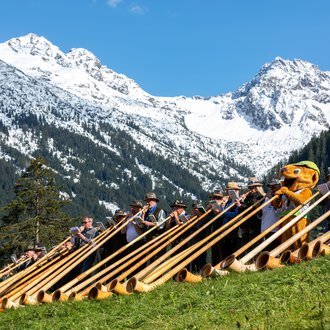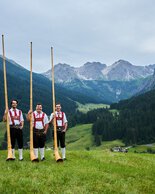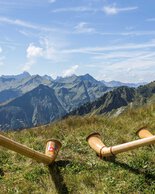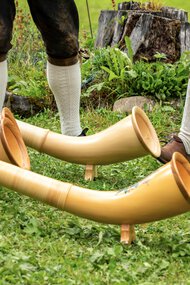The alphorn - The cell phone of the past
22.09.2014

We don't really know what to expect from our alphorn course as part of the Alphorn Days as we descend the stairs to the music pavilion in Mittelberg. It would be kind of embarrassing if we couldn't get any sound out of it. But before we are allowed to try it out, we are welcomed with a “Grüezi” by Swiss composer, alphorn teacher and professional musician Gilbert Kolly, who introduces us to the history of the alphorn.
the Land of the Alphorn
The surprising news first: it is not possible to say with absolute certainty whether the alphorn really originated in Switzerland. Other cultures also used animal horns as wind instruments in the past. Incidentally, the oldest known illustration of a shepherd's horn can be seen in the mountain chapel on a hike to the neighboring Rohrmoos. Also interesting: the alphorn was almost extinct in Switzerland around 1800, as it was considered a poor shepherd's instrument. Today, however, it is becoming increasingly popular not only in Switzerland, but also here in Kleinwalsertal and Allgäu, for example. And that is why we are here today. We also want to be able to have our say.
the right Alphorn
Here we go - after a scrutinizing look at our lips, Gilbert opens his case and selects a specific mouthpiece for each of us. He also hands us an alphorn. Incidentally, the length of the alphorn does not depend on your height, but determines the key in which it is tuned. First of all, we do some breathing exercises to warm up: Breathe deeply into the belly and blow the air out. We also do this with the mouthpiece before we add the alphorn. In the end, this is “only” the amplifier for the sound from our mouthpiece. The first attempt - take a deep breath - and we both manage to produce a sound straight away. It sounds different, but still. Gilbert corrects my posture, I'm probably a bit tense and we carry on. After a few minutes, I'm really out of breath. All the deep breaths and long exhalations are unexpectedly exhausting.
the sound of mountains
We could play 12 notes - we have to make do with one. But that's not too bad for a first attempt. In the end, I'm standing in the morning sun with my eyes on the mountains and manage to hold a note reasonably well. It's a good feeling, somehow playing has a calming effect. I'm sure it has something to do with the conscious, deep breathing. Maybe I should try it out every morning - just blow out the respective mood with sounds into the mountains. Incidentally, this is how shepherds used to do it on the various Alps. They would pass on good news from alp to alp with a cheerful melody on the alphorn - so the others knew: “There's something to celebrate, come and see me”. The cell phone of those days.









